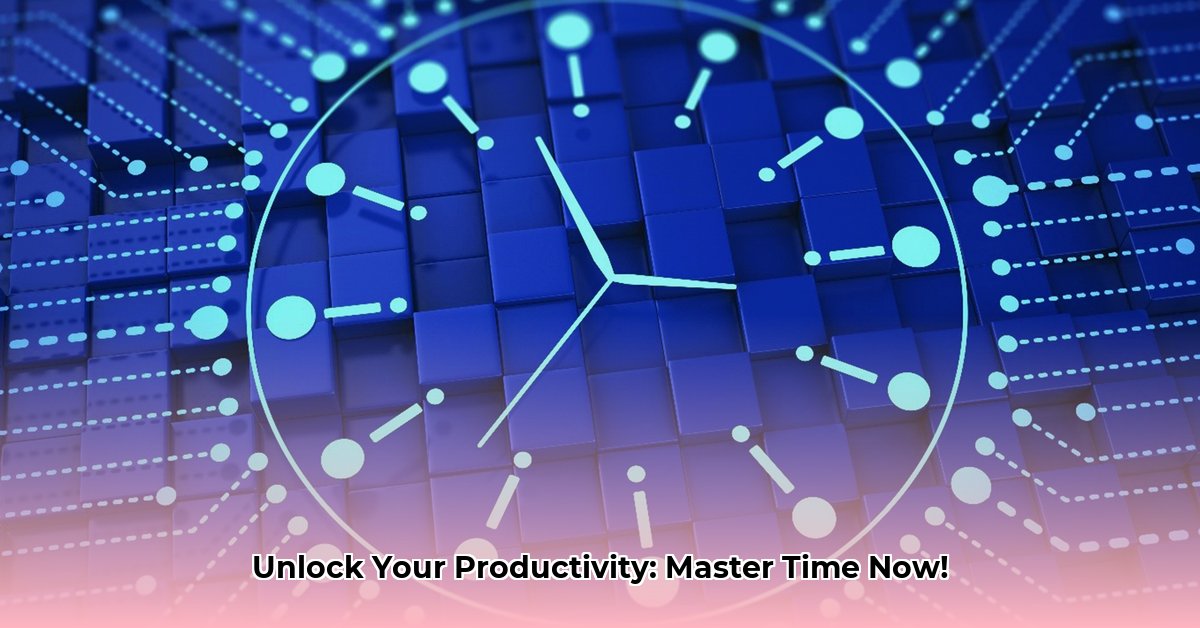Feeling buried under a mountain of tasks? Deadlines looming? You’re not the only one! Many people struggle to manage their time, but the truth is, it’s not about being some kind of super-organized genius. It’s all about having a good plan. For more foundational time management principles, check out this helpful resource: Time management principles. This guide dives into the best time management books out there, showing you the strategies they teach, comparing them side-by-side, and giving you easy-to-follow steps to use them. We’ll help you find the perfect book for your situation and show you how to make these strategies work for you long-term – all based on what’s worked for others. Whether you’re running your own business, climbing the corporate ladder, or just want to get more done each day, this guide is your secret weapon to ditch procrastination and get awesome things accomplished.
Time Management Books: Unlock Your Productivity Potential and Improve Workflow
Feeling overwhelmed by your to-do list? Wish you had more time in the day? You’re not alone! Millions struggle with managing their time effectively. Luckily, there’s a wealth of helpful time management books out there, ready to give you the tools you need to take control of your schedule and boost your productivity. Let’s explore how to find the perfect fit for you and start making real changes, increasing your overall workflow.
Choosing the Right Time Management Book: It’s Personal!
Picking the best time management book can feel like choosing a needle from a haystack. So many options exist, all promising miracles of productivity. But the truth is, what works wonders for one person might be a complete disaster for another. It’s all about finding the right fit for your personality, your work style, and your specific challenges.
Before diving into specific methodologies, ask yourself these questions:
- Are you a structured person or more flexible? Some methods are highly structured, while others offer more freedom.
- Do you prefer a quick win or a long-term strategy? Some books provide immediate tactics, while others focus on building sustainable habits.
- What are your biggest time-wasters? Identifying your weaknesses is crucial in choosing a book that addresses those specific issues.
- What’s your learning style? Do you prefer a step-by-step guide, real-life examples, or a more philosophical approach?
Top Time Management Strategies: An Overview
Several time management approaches offer different perspectives on tackling your day and reducing procrastination:
-
Getting Things Done (GTD): David Allen’s system is about capturing every task, big or small, clarifying what needs to be done next, and organizing everything into manageable projects. It’s a comprehensive system, perfect for detail-oriented folks who thrive on structure. Think of it as a well-oiled machine for your tasks. Are you someone who enjoys a methodical, detailed approach? GTD might be your perfect match.
-
Eat That Frog!: Popularized by Brian Tracy, this technique encourages tackling your most challenging task first thing in the morning. The idea is to get the hardest thing out of the way early, leaving you feeling accomplished and energized for the rest of the day. Do you find yourself procrastinating on the hardest tasks? This could be your secret weapon.
-
Atomic Habits: James Clear’s framework focuses on making tiny improvements to your daily routines. The philosophy is that small, consistent changes accumulate over time to create significant, long-term results. It’s about building sustainable habits rather than quick fixes. Are you looking for lasting change, not just a temporary boost? This might be the approach for you.
-
The 4-Hour Workweek: Timothy Ferriss’s approach focuses on lifestyle design, automation, and outsourcing. It’s about creating systems that allow you to work less and live more. If you’re an entrepreneur or someone looking to escape the 9-to-5 grind, this book may resonate with you.
-
Four Thousand Weeks: Time Management for Mortals: Oliver Burkeman takes a more philosophical approach, encouraging you to accept the limited nature of time and focus on what truly matters to you. It’s less about optimizing every minute and more about living mindfully and purposefully. Feeling overwhelmed by the sheer volume of things to do? This book may offer a valuable shift in perspective.
Mastering Prioritization: More Than Just To-Do Lists
Nearly every time management book emphasizes prioritizing ruthlessly. But how do you actually do it? Some books suggest using urgency/importance matrices (like the Eisenhower Matrix), which helps you categorize tasks based on their urgency and importance. Others advocate for the “eat the frog” method, focusing on the most challenging tasks first. The key is to experiment and find the system that aligns best with your personality and goals.
Remember, effective prioritization isn’t about mindlessly checking things off your list; it’s about aligning your actions with your values and what truly matters in your life. What are your long-term goals? How can you prioritize your time to move closer to achieving them?
Creating Your Personalized Time Management System: A Step-by-Step Guide
Don’t just passively read a time management book; actively incorporate its principles into your life. Here’s a step-by-step guide:
-
Choose Your Method: Select a method (or aspects of several methods) that resonates with you. Don’t try to implement everything at once; start small and build gradually.
-
Start Small, Think Big: Begin with one or two key strategies. Master those before adding complexity. For example, focus on one aspect of prioritization or one habit-building technique before moving to another.
-
Track Your Progress: Monitor how you’re using your time. Use a planner, a journal, or a time-tracking app. This will help you identify what’s working and what needs tweaking.
-
Regularly Review and Adjust: Regularly reflect on your progress—weekly or monthly are good intervals. What’s working well? What could be improved? Adapting your system as you progress is crucial. Your needs and priorities will likely change over time.
-
Be Kind to Yourself: Building new habits takes time and effort. It’s okay to stumble along the way. Celebrate small victories and don’t get discouraged by setbacks.
Technology: A Double-Edged Sword
Technology offers incredible productivity tools – calendar apps, to-do list apps, project management software – but it can also be a significant source of distraction. Many modern time management books acknowledge this challenge. Learn to use technology mindfully. Use apps to block distracting websites or social media during focused work sessions. Schedule specific times for checking emails and messages, rather than constantly reacting to notifications.
The Marathon, Not a Sprint: Sustainable Time Management for the Long Haul
Effective time management isn’t a sprint; it’s a marathon. The goal is to cultivate sustainable habits that support your overall well-being, not just boost your productivity for a short period. Regularly re-evaluate your priorities and adapt your system to fit your changing needs and circumstances. Life is dynamic, and your time management approach should be too.
Ultimately, the best time management book is the one that empowers you to design a system perfectly tailored to your unique lifestyle. Start exploring today—your more productive self awaits!
How to Choose the Best Time Management System for Your Personality and Drive Productivity
Key Takeaways:
- Effective time management is personal. What works for one person might not work for another.
- Understanding your personality is key to finding the right system.
- Experiment with different techniques to discover what best suits your style.
- Consistency and adaptation are crucial for long-term success.
Finding the perfect time management system can feel like searching for the Holy Grail of productivity. But what if the secret isn’t a magic bullet, but understanding yourself? This isn’t about finding the best system; it’s about finding the system that best fits you.
Understanding Your Time Management Style
Before diving into specific methods, let’s identify your personality type. Are you a meticulous planner? A spontaneous go-getter? Or perhaps you thrive under pressure? Knowing your strengths and weaknesses is the first step.
Think of it like choosing a car. A sports car is great for speed, but terrible for hauling groceries. Your time management system is your vehicle for productivity. Choose wisely!
Here’s a quick self-assessment:
- The Planner: You love schedules, detailed to-do lists, and structured approaches.
- The Spontaneous Doer: You prefer flexibility and tackling tasks as they arise.
- The Deadline-Driven Worker: You’re highly productive under pressure.
- The Multitasker: You enjoy juggling multiple projects.
Matching Your Personality to a Time Management System
Once you’ve identified your personality type, let’s match it to a time management system:
1. The Planner: Embrace time blocking, digital calendars (Google Calendar, Outlook), and project management software (Asana, Trello). Break down large tasks into smaller steps. Remember to build in flexibility.
2. The Spontaneous Doer: Prioritize tasks daily, focusing on a few key must-dos. Use task batching to combine similar activities. Simple to-do lists or a notebook can be effective.
3. The Deadline-Driven Worker: The Pomodoro Technique (working in focused bursts with short breaks) can be highly effective. Break down large projects
- Mindfulness Exercises For Anxiety PDF To Reduce Stress - February 26, 2026
- Mindfulness Activities for Adults PDF for Stress Relief - February 25, 2026
- Mindfulness Techniques PDF Offers Free Exercises for Calm and Focus - February 24, 2026














